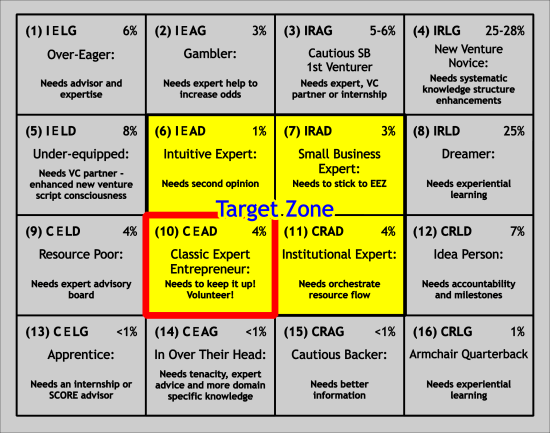Entrepreneurial Expertise Assessment for Jeffrey R. Wingad
This was determined by our New Venture Profile™ technology as administered by the Wasatch Venture Fund in Salt Lake City, Utah. The questionnaire that you completed have been designed especially to evaluate your readiness to venture, but may be useful to a wider range of interested parties including a partner, venturing team member, spouse, financial backers, potential investors, and bankers.
Your Individual Entrepreneurial TYPE:
" (10) CEAD -- Classic Expert Entrepreneur "

DESCRIPTION:
Generally, the CEAD lives up to his or her venturing potential. These venturers make up the group from which many great success stories come. They are venturing experts by training, awareness, desire, resource availability, and discernment.
Although random setbacks can trouble even CEAD's, they generally have the mix of attributes which permits them to surmount them. A CEAD is successful because he or she "has the bases covered". As experts they have a much more complete, detailed and extensive set of success patterns (scripts) than do novices, or other "expert" venturers (IEAD, IRAD, CRAD).
Although many other venture types can be successful, this type is more successful in both magnitude and longevity. This does not mean that the CEAD is invincible; only that the chance that they will falter is generally lower.
WHAT TO DO:
First, keep it up: keep right on venturing. You create the jobs and opportunities for the rest of the economy. Classic Expert Entrepreneurs are only found (preliminarily) in 4% of the business population. This means that for every one of you there are twenty four who could benefit from your expertise. Which leads to the second suggestion: volunteer.
Become active in your local or regional venture group, get involved in the Entrepreneurial Center at a nearby college or university; or make yourself available to a Small Business Development Center. Not that there is nothing left to learn for you; but there is much more for you to share. Don't be stingy
IMPLICATIONS OF THE NEW VENTURE PROFILE™ TYPES
A "C" most likely indicates that you are aware or conscious of the common patterns which occur in entrepreneurial activity. Realization that there is a venturing "script" is a key ingredient in overall entrepreneurial expertise. This could come as a result of training, or from a general awareness which comes from experience.
A "E" signifies that you probably have a high desire or eagerness to be involved in business venturing, that you are ready to take action to make this a reality. E's generally have been "primed" to venture, most often from past experiences either good or bad, and from their perception of their ability to succeed in a particular deal or deal environment. They would rather "plunge in" than miss a great opportunity.
An "A " probably means that you have resources (cash, technology, contacts etc.) and acumen which makes you able to be a "player" in the new venture arena. Often A's assume that because they are "able", they are "capable", which is not always the case, and results in losses incurred but experience gained. A 's also have, or should understand that some kind of "bargaining advantage" is required for long-term venture success.
A "D" most often describes the level of capability you possess to discern whether conditions within and surrounding the venture fit the entrepreneurial success script. D's generally have a significant level of experience in a particular new business domain, and may often recognize more quickly what novices in this domain take a while to see. Often a D can have a larger, more-differentiated knowledge structure, with less biased recall of information relevant to particular new venture problems.
An "I " typically is unaware of and may not believe that an "entrepreneurial expert script" is possible. I's usually make their venturing judgments based upon intuition, instinct or their knowledge of human nature . They may be unaware of the expert script which they actually follow when the script is "acquired but unconscious".
An "R" means that you are reluctant to venture, perhaps more risk averse or cautious in economic endeavors. R's would rather not have to worry about venture risk, preferring instead to spend time and resources elsewhere. An R prefers to be thoroughly informed, and would rather get through life financially in one piece, than to "make it big".
An "L" probably means that you are somewhat limited in your capability to participate in new venture activity. This may result from lack of sufficient resources, or from personal preferences and sphere of influence which are not as closely associated with the entrepreneurial community. An L may also indicate the lack of a venturing track record or small numbers bargaining advantage in competitive situations.
A "G" indicates that some guesswork is a part of your new venture profile. The odds go against those who attempt a new business in "uncharted waters". Accordingly G's should carefully consider the risks associated with not "sticking to their knitting" (Peters & Waterman, 1982). Also, a G might indicate the propensity for you to unwisely consider diversification outside your "target zone" of extraordinary expertise, to be overconfident of your venturing ability, or to be a bit out of touch with venturing realties.
Jeffrey R, Wingad, Trustee. info2@magwerks.co (not .com) Phone: 801.550.7070
|
